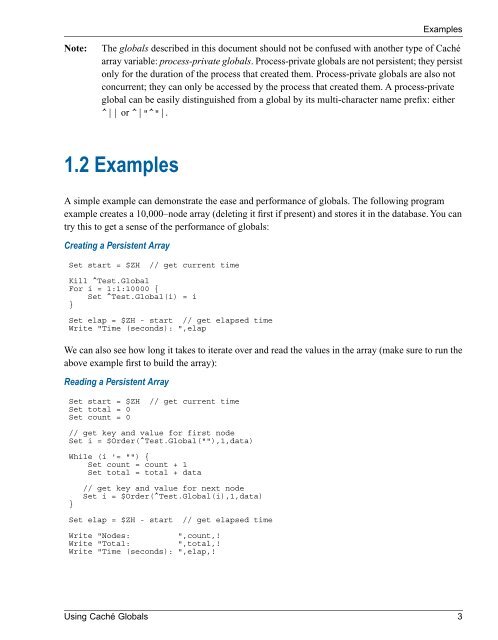Introduction• Simple to use — <strong>Globals</strong> are as easy to use as other programming language variables. A comprehensiveset of commands in both the <strong>Caché</strong> ObjectScript language and the <strong>Caché</strong> Basic scriptinglanguage make it extremely easy to use globals within applications.• Multidimensional — You can specify the address of a node within a global using any number ofsubscripts. For example, in ^Settings("Auto2","Properties","Color"), the subscriptColor is a third-level node within the Settings global. Subscripts can be integer, numeric, or stringvalues, and need not be contiguous.• Sparse — The subscripts used to address global nodes are highly compacted and need not havecontiguous values.• Efficient — The operations on globals — inserting, updating, deleting, traversing, and retrieving— are all highly optimized for maximum performance and concurrency. There are additionalcommands for specialized operations (such as bulk inserts of data). There is a special set of globalsdesigned for temporary data structures (such as for sorting records).• Reliable — The <strong>Caché</strong> database provides a number of mechanisms to ensure the reliability of datastored within globals, including both logical-level and physical-level journaling. Data stored withinglobals is backed up when a database backup operation is performed.• Distributed — <strong>Caché</strong> provides a number of ways to control the physical location of data storedwithin globals. You can define a physical database used to store a global, or distribute portionsof a global across several databases. <strong>Using</strong> the distributed database features of <strong>Caché</strong>, you canshare globals across a network of database and application server systems. In addition, by meansof data shadowing technology, data stored within globals on one system can be automaticallyreplicated on another system.• Concurrent — <strong>Globals</strong> support concurrent access among multiple processes. Setting and retrievingvalues within individual nodes (array elements) is always atomic: no locking is required to guaranteereliable concurrent access. In addition, <strong>Caché</strong> supports a powerful set of locking operationsthat can be used to provide concurrency for more complex cases involving multiple nodes. Whenusing Object or SQL access, this concurrency is handled automatically.• Transactional — <strong>Caché</strong> provides commands that define transaction boundaries; you can start,commit, or rollback a transaction. In the event of a rollback, all modifications made to globalswithin the transaction are undone; the contents of the database are restored to their pre-transactionstate. By using the various <strong>Caché</strong> locking operations in conjunction with transactions, you canperform traditional ACID transactions using globals. (An ACID transaction provides Atomicity,Consistency, Isolation, and Durability.) When using Object or SQL access, transactions are handledautomatically.2 <strong>Using</strong> <strong>Caché</strong> <strong>Globals</strong>
ExamplesNote:The globals described in this document should not be confused with another type of <strong>Caché</strong>array variable: process-private globals. Process-private globals are not persistent; they persistonly for the duration of the process that created them. Process-private globals are also notconcurrent; they can only be accessed by the process that created them. A process-privateglobal can be easily distinguished from a global by its multi-character name prefix: either^|| or ^|"^"|.1.2 ExamplesA simple example can demonstrate the ease and performance of globals. The following programexample creates a 10,000–node array (deleting it first if present) and stores it in the database. You cantry this to get a sense of the performance of globals:Creating a Persistent ArraySet start = $ZH // get current timeKill ^Test.GlobalFor i = 1:1:10000 {Set ^Test.Global(i) = i}Set elap = $ZH - start // get elapsed timeWrite "Time (seconds): ",elapWe can also see how long it takes to iterate over and read the values in the array (make sure to run theabove example first to build the array):Reading a Persistent ArraySet start = $ZH // get current timeSet total = 0Set count = 0// get key and value for first nodeSet i = $Order(^Test.Global(""),1,data)While (i '= "") {Set count = count + 1Set total = total + data}// get key and value for next nodeSet i = $Order(^Test.Global(i),1,data)Set elap = $ZH - start // get elapsed timeWrite "Nodes:",count,!Write "Total:",total,!Write "Time (seconds): ",elap,!<strong>Using</strong> <strong>Caché</strong> <strong>Globals</strong> 3

















